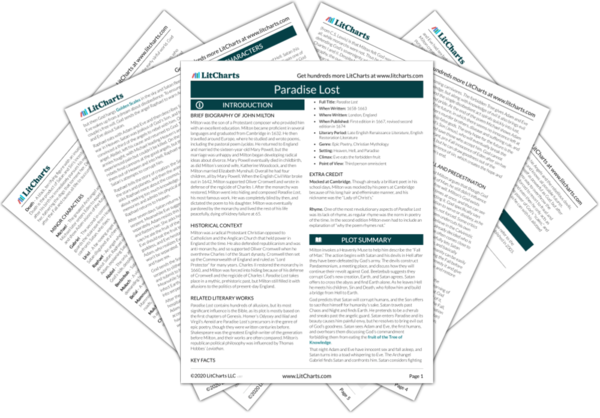Hierarchy and Order
In portraying the “Fall of Man” and the war in Heaven, Milton spends much of Paradise Lost describing the universal hierarchy and order that these events upset. In his 17th century view of the cosmos, Heaven exists above, Earth below, and Hell and Chaos below that. Within this geographically ordered cosmos, the most important hierarchy of Heaven is that of God as supreme monarch, the creator and ruler of the universe, and his “only begotten”…
read analysis of Hierarchy and OrderDisobedience and Revolt
Paradise Lost is about the fall of humanity and the rebellion of Satan and his angels, so the plot and conflict almost entirely come from acts of revolt against the hierarchy of God’s universe. The “Fall” comes when Satan grows jealous of God honoring the Son so highly. Satan then convinces a third of Heaven’s angels to rebel with him, claiming that they should be honored as gods and not have to worship God…
read analysis of Disobedience and RevoltSin and Innocence
Paradise Lost is basically a dramatization of the “original sin,” the explanation of how evil entered a world that began as God’s perfect creation. For a Christian like Milton, sin is everything that breaks God’s laws, including acts that do harm to other humans and acts that upset the hierarchy of the universe. God’s Heaven of good Angels and the original Paradise are both innocent places, free from any sin and unhappiness, and Milton…
read analysis of Sin and Innocence
Free Will and Predestination
In Paradise Lost Milton argues that though God foresaw the Fall of Man, he still didn’t influence Adam and Eve’s free will. Milton’s God exists outside of time and so sees all times at once, and thus can see the future without actively affecting it. God specifically says that he gives his creatures the option to serve or disobey, as he wants obedience that is freely given, not forced. Some critics have claimed that…
read analysis of Free Will and PredestinationLove and Marriage
Love is one of the Christian God’s most important attributes, and Heavenly love also takes center stage early in the poem as the angels ceaselessly worship God and commune with each other in joy, and the Son offers himself as a sacrifice for humankind out of love for them. Then when Adam and Eve are created, the poem partly shifts its focus to mortal love and the idea of marriage.
Milton was seen as…
read analysis of Love and Marriage











